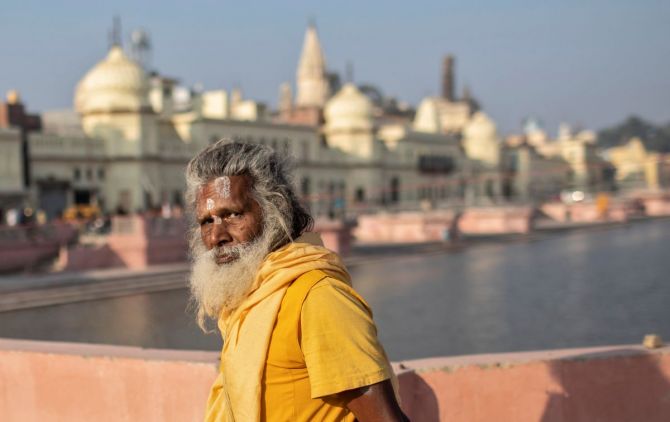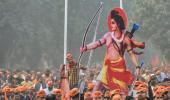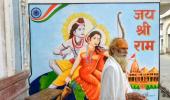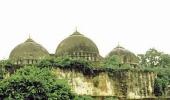'We all know that when the Babri Masjid was demolished, P V Narasimha Rao was prime minister.'
'He did not do anything to stop the demolition.'

A centuries-old controversy will finally come to an end on August 5, 2020, when Prime Minister Narendra Damodardas Modi performs the bhoomi puja at the site of the Ram Janambhoomi in Ayodhya.
The 'Babri Masjid-Ram Janambhoomi' issue rocked the foundation of India's secular fabric. India's politics has never been the same since the shilanayas was first performed at the then disputed site in 1989.
The Bharatiya Janata Party, which won only two seats in Parliament in 1984, rode the temple issue to power after adopting a resolution to build a grand temple will be built at the birthplace of Lord Ram in Ayodhya. Along with abrogating Article 370 and ushering in a Uniform Civil Code, Ayodhya became the third of the BJP's core issues.
Author Hemant Sharma, who has witnessed the tumultuous events for the past 35 years and chronicled them in his book Ayodhya Ka Chashmadeed (An eyewitness to Ayodhya), believes that the Congress party should get more credit for the Ram temple than the BJP.
"The BJP came into the picture in 1989 when, during their Palampur convention in Himachal Pradesh, they passed a resolution and adopted the demand for a Ram temple in Ayodhya as a part of their election manifesto," says Sharma.
"They then had no idea that in such a less time they will be able to build the temple at the site which is disputed for 500 years," Sharma tells Rediff.com's Syed Firdaus Ashraf in the first part of the interview.
Soon after Independence, then prime minister Jawaharlal Nehru had told then President Dr Rajendra Prasad that, being the head of a secular State, the latter should not attend the Somnath temple's inauguration.
Now, 73 years later, Prime Minister Modi is expected to lay the foundation stone of the Ram Mandir at Ayodhya.
>Is it a sign of how far right the Republic has travelled in these years?
Two important events took place during the early years of Independence.
First, the Somnath temple was reconstructed and another, on the intervening night of December 22-23, 1949, the idols of Ram, Sita and Lakshman were placed inside the Babri Masjid premises.
If Pandit Jawaharlal Nehru was so concerned about India's secularism, then he should have got those idols removed right then.
Moreover, Nehru should have taken a stance that the the President must not visit the Somnath temple because the President works on the advice of his ministers.
On the Babri Masjid issue, Nehru wrote a letter to then Uttar Pradesh chief minister Gobind Ballabh Pant that he should follow his duties as the Constitutional head of the province.
If you dig more into the past, you will find that whatever happened to the Babri Masjid was during Congress rule.
On February 1, 1986, the Congress government in Uttar Pradesh gave an undertaking in court that if the locks of the Babri Masjid are opened, there won't be any law and order problem.
At that time Rajiv Gandhi was prime minister and Vir Bahadur Singh was Congress chief minister of Uttar Pradesh.
On November 1, 1989, the Allahabad high court allowed shilanyas on the 2.77 acre plot.
Rajiv Gandhi sent Buta Singh, the then home minister, to Ayodhya who got an undertaking from the Faizabad district collector that the shilanyas will not take place inside the Babri Masjid premises.
Then, during the 1989 general election, Rajiv Gandhi started his campaign from Ayodhya and declared that he will bring in 'Ram Rajya'.
And we all know that when the Babri Masjid was demolished, P V Narasimha Rao was the prime minister.
He did not do anything to stop the demolition. Therefore, the Congress is more responsible for the Ram Mandir than the BJP.
The BJP came into the picture in 1989 when, during their Palampur convention in Himachal Pradesh, they passed a resolution and adopted the demand for a Ram temple as a part of their election manifesto.
They then had no idea that in such less time, they will be able to build the temple at the site which was disputed for 500 years.
But...
(Interrupts) 500 years ago, the rule was 'might is right'. The Babri Masjid structure was not demolished for the first time in 1992.
It was first demolished in 1855 and then in 1934. In 1934, all the three domes of Babri Masjid were demolished.
The then British collector got them rebuilt with taxpayer money.
Are you saying that Nehru should have got the Ram idols removed?
I am only saying that if Nehru was honest, then he should have made an attempt to remove the idols. Why didn't he try?
In the last 30 years, did you ever feel this problem could have been solved amicably?
When Chandra Shekhar was PM for four months, a committee was formed compromising historians and archaeologists and Syed Shahabuddin (a prominent Muslim leader), had said that if the committee was able prove that a temple existed at the site, Muslims will give up their claim.
Three meetings were held. The historians started coming out with facts, and evidence (of a temple) started emerging.
The archaeological department dug out all the proof. The Supreme Court gave its judgment based on those evidence only.
The trouble started when the Babri Masjid Action Committee withdrew and did not turn up for the fourth meeting.
Unfortunately, the Chandra Shekhar government did not last long, but that attempt was very close as it was headed by Chandra Shekhar himself and BJP leader Bhairon Singh Shekhawat (who later became Vice-President).
The Supreme Court too gave enough time and opportunities to resolve the issue amicably, but no one was ready to accept a workable solution.
And the reason no one was ready to accept a solution was because the issue was ideological (on both sides).
Dr Rafiq Zakaria, in his book Widening Divide/em>, says that Hindu-Muslim relations have never been the same after the Ram Janambhoomi movement. Do you agree?
Yes, it has happened. The upper castes and the other backward castes were divided over the Mandal Commission in 1989.
To overcome this divide, kamandal (a symbol of sadhus) was brought in by the other group (the BJP).
After this, Hindu society united in such a way that all of them -- forwards, OBCs, Dalits -- came under the banner of Hindu dharma.
This also translated into votes as the BJP, which won only two seats in 1984, went on to win over 300 seats and form the government in 2019.
The party of the man who criticised Dr Rajendra Prasad for visiting the Somnath temple was reduced to just 50-odd seats in 2019.
The bonhomie between Hindus and Muslims, which we saw prior to 1989, was never seen again and I don't think it is possible now.
Muslim society, if they had sensed that this judgment would not go in their favour, should have given up their claim on the Babri Masjid and allowed the Hindus to build a temple.
Had they done that, there would have been a strong unity between Hindus and Muslims.
Even the Supreme Court judgment is not judicial justice, but is more like a political statement, by giving the disputed land to the Hindus while giving land for Babri Masjid at a distance.
They worked out a formula. No one had asked for land for the Babri Masjid at some other place.
There is a theory that Marxist historians spoiled the chances for an amicable solution. How far is this true as archaeologist K K Muhammad was the first one to say that the remnants of a temple were found below the Babri Masjid?
Marxist historians have caused maximum damage to Hindu-Muslim relations.
There was a possibility that you could argue whether this place is the Ram Janambhoomi or not. You could argue whether Ram was born in Ayodhya or not.
(But) Marxist historians took the debate to another level by stating (that) Ram did not exist, that it is mythology and not history.
Now if you ask for a birth certificate of Lord Ram, you are uniting different Hindu sections, who are all deeply religious.











 © 2025
© 2025